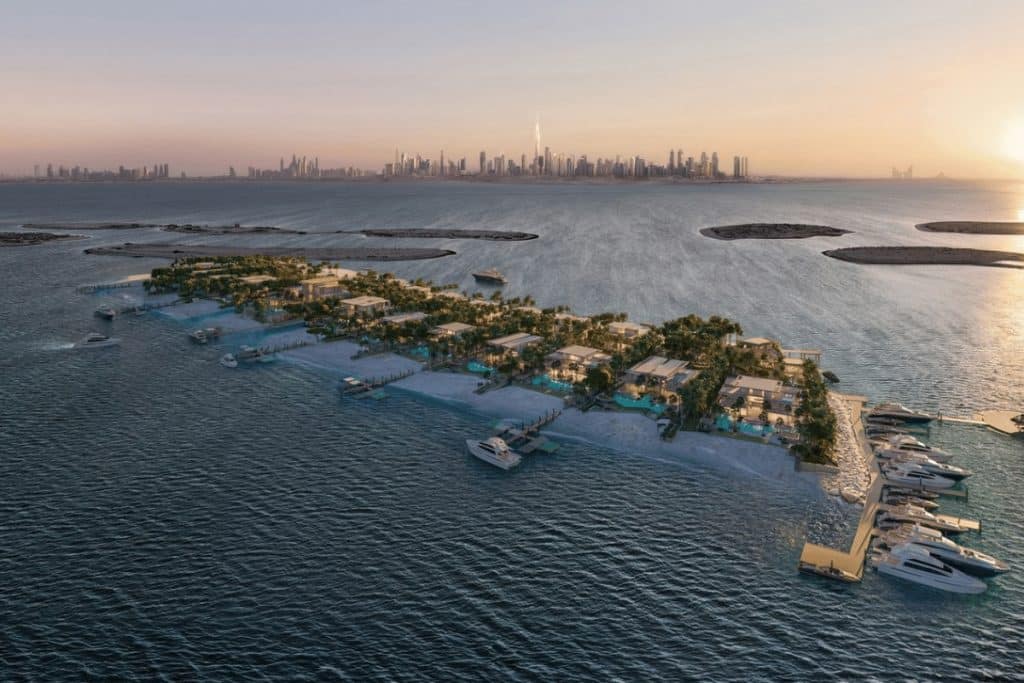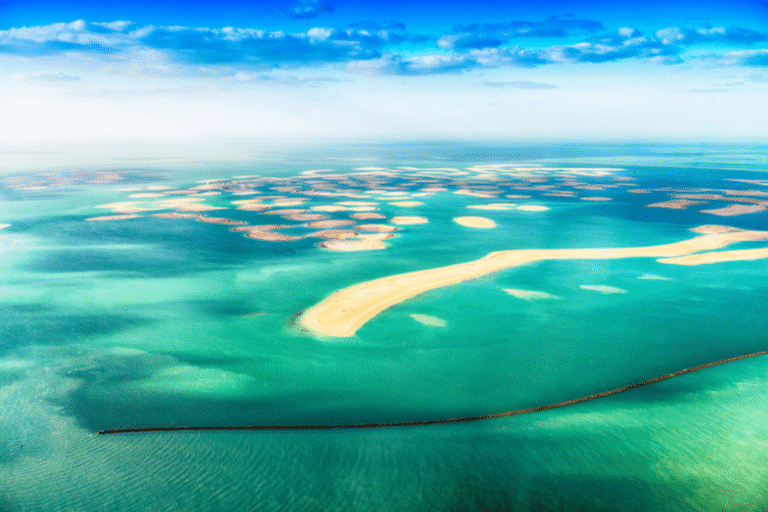Executives and brokers say demand from billionaires and family offices has returned to the World Islands after more than 15 years of limited activity. Market reports and broader listings suggest pricing spans from around AED 50-125 million ($14-34 million). Entire islands could command up to AED 588 million ($160 million), according to Ben Bandari, founder and CEO of property firms Benco and DevCore.
“When The World Islands was first announced, it was seen as one of the most daring real estate projects ever attempted – pure Dubai ambition,” Bandari told Arabian Business.
“Now… they’re viewed as an ultra-exclusive opportunity that simply doesn’t exist anywhere else in the world.”
Nakheel, the original master developer, completed 97 per cent of reclamation by 2008, and three projects have been delivered since then: Lebanon Island, an Anantara resort on Argentina Island, and the early phases of the Heart of Europe.
While much of the archipelago remains undeveloped, momentum is shifting. A real estate industry source under the condition of anonymity told Arabian Business that major developers have already acquired islands for boutique hotel schemes, though these deals have not yet been independently verified.
Global wealth seeks exclusivity

The islands were originally conceived as a playground for the global elite but were left largely undeveloped after investor confidence evaporated during the 2008 financial crisis. Bandari said today’s buyers reflect “the apex of global wealth,” including ultra-high-net-worth individuals, family offices and a small number of developers.
“Buyers are coming from Europe, the GCC, Russia, India, and increasingly from the US and Asia,” he said. “These are people who already own prime properties globally. The World Islands is about adding something one-of-a-kind to their portfolio.”
Prestige and scarcity have proven decisive for many. “Palm Jumeirah is five minutes from Sheikh Zayed Road. The World Islands is a boat or helicopter ride away,” Bandari added. “That’s both a challenge and a selling point. The privacy and seclusion are unmatched.”
Momentum today builds on earlier projects that proved demand existed. In May last year, siblings Ali and Amira Sajwani’s Amali Properties sold 22 of 24 villas on Sao Paulo and Uruguay islands within weeks of launch, raising between AED 1.4 billion and AED 1.5 billion ($380 million-$410 million).
At the time, Ali Sajwani pointed to unique features such as private berths at 12 villas that would allow owners to dock yachts directly outside their homes. The Sajwanis developed Amali independently of the DAMAC group as a separate legacy project, he told Arabian Business.
Hospitality expansion accelerates
Large-scale hospitality projects are also underway. Austrian developer Kleindienst Group is pressing ahead with its $6 billion Heart of Europe project, which will deliver more than 5,000 hotel rooms across 20 themed properties by 2027.
“Fifteen hotels are currently under construction at different stages. The remaining five will start this year,” founder and chairman Josef Kleindienst told Arabian Business in a recent interview. “Our goal is for all of them to be complete by 2027.”

The development represents around 10 per cent of Dubai’s five-star hotel inventory, based on Department of Economy and Tourism figures showing 52,700 existing rooms. Kleindienst has avoided bank financing, using a 50:50 model of company capital and off-plan sales. The company offers guaranteed returns on some units, though these have not been independently verified.
The only fully operational hotel under the Heart of Europe project is the voco Monaco, an adults-only boutique property that officially opened last year. The Nice Hotel, also part of Kleindienst Group’s Côte d’Azur resort, is completed and in its pre-opening phase.
Five-star family-only resort, Portofino Hotel, is currently under construction, Kleindienst revealed. Other partially completed or sold assets under the project include The Floating Villas, Sweden Beach Palace at Sweden Island, and villas on Germany Island – many of which are at an advanced handover stage.
Five more hotels are due to begin construction this year, including branded concepts such as Buddha-Bar Hotel and Ibiza, each following a two-year build cycle.
Scarcity underpins pricing
Amali villas have been priced at up to AED 250 million ($68 million), while Heart of Europe floating villas and suites are marketed at similar levels. Bandari said pricing is competitive compared with global trophy assets.
“Branding plays a huge role,” he said. “Owning part of the World Islands is the ultimate conversation piece.”

The renewed appetite for the World Islands comes against the backdrop of Dubai’s record-breaking luxury market, which saw 435 home sales above $10 million in 2024 – the most of any city globally – and a further 111 in Q1 2025 alone, its strongest opening quarter on record, according to Knight Frank.
“Exclusivity is another driver… you’re buying something that only a handful of people on earth will ever have,” Bandari said. “Plus, Dubai’s luxury market has entered a new golden era – the appetite for statement properties is stronger than ever.”
Despite investor optimism, infrastructure remains a hurdle. The islands are not connected to Dubai’s municipal utilities. This has forced developers to build standalone systems for power, water and waste. Kleindienst has invested in sewage treatment, water recycling and accommodation for 3,000 workers.
“The World Islands are very complex in regards of improvements, because [they’re] not connected to the infrastructure,” he said. “Nobody in Dubai has the burden of such high-level environmental regulation like the World Islands.”
Transport is another challenge, according to Bandari.
“There are talks of upgraded marina facilities, more regular transport links, and enhanced utilities – once those are in place, we could see a surge in demand,” he revealed.
For the first time since the financial crisis, the World Islands are moving from concept to delivery, with both residential and hospitality projects now underway.

